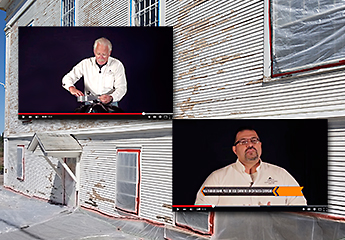
Scott Alquist and Adalberto Rosas, instructors at TMCC’s Safety Center, scripted and appeared in lead-safety videos that are available in both English and Spanish.
Lead-safety instructors at Truckee Meadows Community College have partnered with the city of South Lake Tahoe to provide bilingual instructional videos for families who are repairing or remodeling their homes.
“The lead in lead-based paint is a neurotoxin and even a very small amount can lead to serious health issues for children, adults and even household pets,” said Scott Alquist, Program Manager, TMCC Safety Center.
Alquist and Adalberto Rosas, a Spanish-speaking instructor at TMCC’s Safety Center, scripted and appeared in the videos that are published in both English and Spanish. Camera work, editing and post-production were completed at Lake Tahoe Television.
The 11-minute instructional films are intended for residents of South Lake Tahoe who might be planning renovations to older structures that house children. Videos are available as a free DVD or accessed on YouTube.com.
A small supply kit is also provided to better perform lead clean-up and disposal:
- Mask
- Nitrile gloves
- Plastic Sheeting
- Duct tape
- Spray bottle
- Tyvek Suit
- Boot Covers
The Lead Safety Tahoe Program Aims To Protect Kids From Lead Exposure
Lead Safety Tahoe is a federal program that helps families who own or rent a property keep children safe from lead hazards in building materials such as paint.
“We have been providing renovation, repair and painting certification classes through Lake Tahoe Community College for quite a few years now,” Alquist said. “City of South Lake Tahoe received some grants to help pay for the folks in that area to attend our classes. The video was the city’s idea and was set up by ‘Lead Safe Tahoe,’ the office that was formed under those grants.”
Lead-based paint is safe if it is intact or covered with paneling, but becomes dangerous if the surface becomes chipped, or if renovations break into the coating. Paint is a leading carrier of lead poisoning in the home.
In the U.S., it is estimated that about 38 million homes may have walls painted with lead-based products, and four million of these structures could expose children to lead contamination.
Lead poisoning has few obvious symptoms, but can affect all of the body’s systems, especially the brain, nervous system and kidneys, according to the Environmental Protection Agency (EPA). A very large dose of lead can kill.
“Lead poisoning in children has symptoms that are easily confused with ADD or ADHD,” Alquist said. “In children, the symptoms include hyper-activity, decreased learning ability, behavioral problems and can be permanent. In adults, symptoms are high blood pressure, loss of sex drive or capability and physical fatigue.”
The Lead Safety Tahoe program pays for low income families with a child under the age of six living in or frequently visiting a home built before 1978 to:
- Screen for lead-based materials
- Control lead hazards
- Test children’s blood for lead level
Contamination, Protection, Cleaning and Disposal of Lead Are Covered in the Video
The film is narrated by Alquist and Rosas with cut-aways to scenes of remodels in progress, or to show tools used in lead clean-up.
“Please remember that lead is poisonous and you always want to work in a lead safe manner,” Alquist said.
He explains the amount of danger present in lead, basic federal guidelines, and covers procedures that EPA-certified renovators typically employ.
Additional concepts presented in the films are:
- Containing debris and dust
- Protecting neighbors, the environment and oneself
- Cleaning lead contaminated surfaces
- Approved disposal methods
Alquist and Rosas demonstrate how to control contaminated dust by placing debris in a large trash bag and using a double-goose-neck method of sealing the neck of the bag. They also demonstrate proper removal of Personal Protective Equipment (PPE) such as synthetic rubber gloves.
For more information about the lead safety videos or TMCC Safety Center, phone 775-857-4958.






